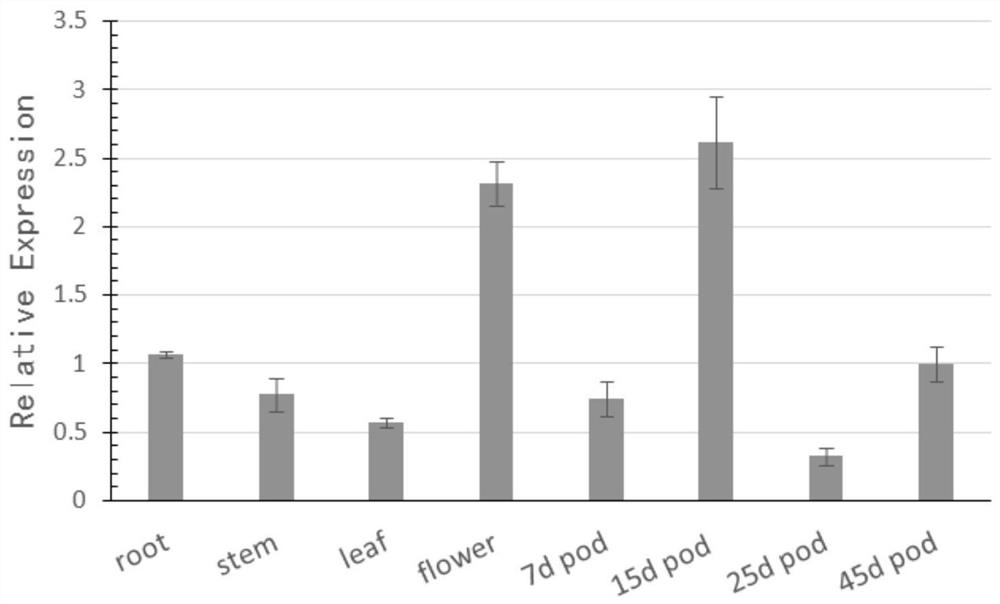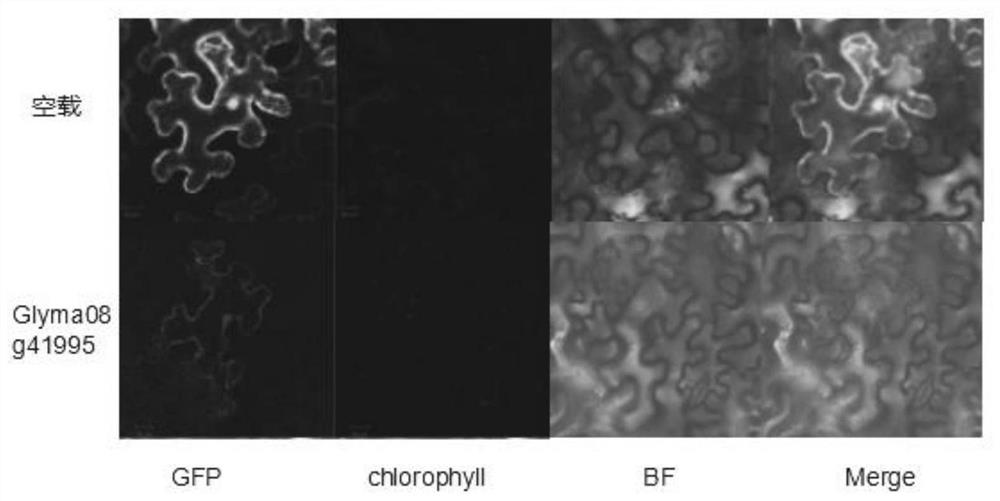Application of a soybean nac transcription factor family gene glyma08g41995
A technology of transcription factor and family, which is applied in the application field of soybean NAC transcription factor family gene Glyma08g41995, can solve the problem that NAC transcription factors are not exactly the same, and can reduce the phenomenon of split pods, the number of branches and the height of plants. Effect
- Summary
- Abstract
- Description
- Claims
- Application Information
AI Technical Summary
Problems solved by technology
Method used
Image
Examples
Embodiment 1
[0032] Example 1 Cloning and identification of soybean Glyma08g41995 and its encoding gene
[0033] Primers were designed according to the sequence information of Glyma08g41995 predicted by the phytozome website, and the flower cDNA of Willmas82 in full bloom was used as a template for PCR amplification.
[0034] Upstream primer Gm08g41995-F: ggatcttccagagatCTTTGGCGTGGTTTGGA; (SEQ ID NO.3)
[0035] Downstream primer Gm08g41995-R: ctgccgttcgacgatCAATCAATGGAAAAGGGA. (SEQ ID NO. 4)
[0036]The Glyma08g41995 gene was amplified from the total RNA of soybean flower organs by RT-PCR. Take the soybean flower tissue, grind it with a mortar, add a 1.5mL EP tube containing the lysis solution, shake it sufficiently, and then transfer it into a glass homogenizer. After homogenization, it was transferred to a 1.5mL EP tube, and total RNA was extracted using a plant total RNA extraction kit (TIANGEN DP404). The total RNA quality was identified by formaldehyde denaturing gel electrophores...
Embodiment 2
[0037] Example 2 Expression characteristics of Glyma08g41995 in different organs of soybean
[0038] RNA was extracted from roots, stems, leaves, flowers, 7d pods, 15d pods, 25d pods, 45d pods and seeds of Willmas82, and reversed into cDNA for RT-PCR analysis.
[0039] The extraction of total RNA was the same as in Example 1. The soybean constitutively expressed gene Tubulin was used as the internal reference gene, and its amplification primer was the Tubulin forward primer sequence: GGAGTTCACAGAGGCAGAG (SEQ ID NO.5), and the Tubulin reverse primer sequence: CACTTACGCATCACATAGCA (SEQ ID NO.6). Real-time quantitative PCR analysis was performed using cDNA from different soybean tissues or organs as templates. The amplification primers for Glyma08g41995 were: qGm41995-F: TGGATTTAGATTCCATCCCACA (SEQ ID NO. 7), qGm41995-R: GCCTTTGCCAGCACTTCC (SEQ ID NO. 8). result ( figure 2 ) analysis showed that the expression of Glyma08g41995 was relatively high in flowers and pods, suggesti...
Embodiment 3
[0040] Example 3 Subcellular localization of Glyma08g41995
[0041] Subcellular localization adopts the method of tobacco transient expression, the vector used is pGFC5941, the primers are P2-Gm41995-F:acaaatctatctctctcgagATGAATGCTAAGGTACATAGCTCTG (SEQ ID NO.9), P2-Gm41995-R:gctcaccatggatccGAAAAGTAGGGTGGAATATATGTTCC (SEQ ID NO.10). PCR amplification, after the target band is correct, the gel is recovered by tapping, and the recovered product is connected to the vector by homologous recombination to construct the subcellular localization vector P2-Glyma08g41995 (the gene is at the N-terminus of GFP), and the infection solution is prepared and injected into the The backside of tobacco leaves grown for about 60 days was cultured in the dark for 48 hours after transient expression, and irradiated with Zeiss, LSM780 laser confocal microscope to observe the localization of the GFP reporter gene. The result is as image 3 As shown, the transfected plasmid was distributed in the whol...
PUM
 Login to View More
Login to View More Abstract
Description
Claims
Application Information
 Login to View More
Login to View More - R&D
- Intellectual Property
- Life Sciences
- Materials
- Tech Scout
- Unparalleled Data Quality
- Higher Quality Content
- 60% Fewer Hallucinations
Browse by: Latest US Patents, China's latest patents, Technical Efficacy Thesaurus, Application Domain, Technology Topic, Popular Technical Reports.
© 2025 PatSnap. All rights reserved.Legal|Privacy policy|Modern Slavery Act Transparency Statement|Sitemap|About US| Contact US: help@patsnap.com



